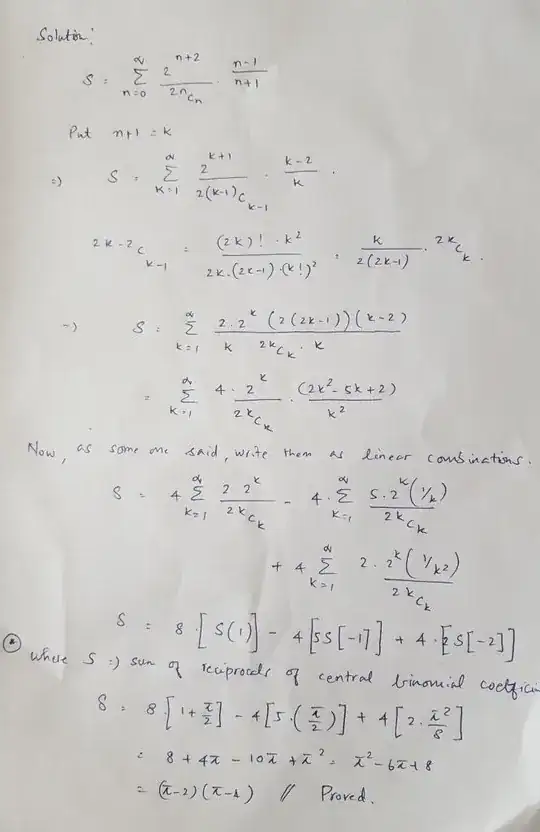Hint. By using the Euler beta function, one has
$$
\frac{2^{n+2}(n-1)}{{2n \choose n}(n+1)}=\frac{4(n-1)(2n+1)}{n+1}\int_0^1(2x(1-x))^ndx,\quad n \geq 0. \tag1
$$ Then, one may obtain
$$\begin{align}
&\sum_0^\infty\frac{2^{n+2}(n-1)}{{2n \choose n}(n+1)}
\\\\&=\sum_0^\infty\frac{4(n-1)(2n+1)}{n+1}\int_0^1(2x(1-x))^ndx\\\\
&=\int_0^1\sum_0^\infty\frac{4(n-1)(2n+1)}{n+1}(2x(1-x))^ndx \:dx\\\\
&=\int_0^1\left(\frac{-40x^2+40x-12}{(1-2 x+2 x^2)^2}-\frac{4 \log(1-2 x+2 x^2)}{(1-x) x}\right)dx\\\\
&=\underbrace{\int_0^1\frac{-40x^2+40x-12}{(1-2 x+2 x^2)^2}\,dx}_{\large \color{blue}{8-6\pi}}+\underbrace{4\int_0^1-\frac{\log(1-2 x+2 x^2)}{(1-x) x}\,dx}_{\large \color{red}{\pi^2}}
\\\\&=\color{blue}{8-6\pi}+\color{red}{\pi^2}
\\\\&=(\pi-2)(\pi-4)
\end{align}
$$
as announced.
Some details.
Observe that
$$
\sum_{n=0}^\infty(2n-3)y^n=\frac{5 y-3}{(1-y)^2},\quad |y|<1, \tag{A}
$$
$$
\sum_{n=0}^\infty\frac1{n+1}y^n=-\frac{\log(1-y)}y,\quad |y|<1, \tag{B}
$$ One has
$$
\frac{4(n-1)(2n+1)}{n+1}=4(2 n-3)+\frac8{1+n} \tag{C}
$$ then, using $(\text{A})$, $(\text{B})$ and $(\text{C})$ with $y:=2x(1-x)$ gives
$$
\sum_0^\infty\frac{4(n-1)(2n+1)}{n+1}(2x(1-x))^n=\frac{-40x^2+40x-12}{(1-2 x+2 x^2)^2}-\frac{4 \log(1-2 x+2 x^2)}{(1-x) x}
$$ One may classically integrate the fraction by parts. One may then rewrite the $\log$-term as
$$
-\frac{4 \log(1-2 x+2 x^2)}{(1-x) x}=\frac{16}{1-u^2}\log \left(1-\frac{1-u^2}2\right) \tag{D}
$$ with $u:=2x-1$, expanding in power series of $(1-u^2)$, integrating termwise to recognize a classic binomial series giving $\pi^2$.
